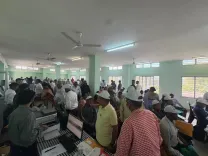Is the Indian Mujahideen Planning a Comeback as a ‘Homegrown’ Terror Group in India?

Synopsis
Key Takeaways
- The Indian Mujahideen has issued statements against Assam's eviction drives.
- Historical context reveals their past terrorist activities from 2008 to 2014.
- Leaders are reportedly in Pakistan, indicating a potential revival.
- Exploitation of regional tensions remains a tactic for mobilization.
- Security agencies express concerns over possible threats.
New Delhi, Aug 18 (NationPress) The Indian Mujahideen has recently issued a statement condemning the Assam government's current eviction initiative, which aims to remove illegally occupied land. Once a formidable militant group in India, the Indian Mujahideen has urged its followers to oppose this drive, labeling it an assault on particular communities.
From 2008 to 2014, the Indian Mujahideen executed multiple bombings and was recognized as one of the most audacious terrorist organizations in the nation, even sending emails hours before executing attacks. However, the arrest of key figures like Yasin Bhatkal led to its decline.
The recent seven-minute statement regarding the eviction operation in Assam is unexpected. This faction, a splinter of the banned Students Islamic Movement of India (SIMI), was thought to be defunct. Nonetheless, Indian intelligence agencies detect a potential plan for resurgence.
Although the main leaders in India are incarcerated, the founders, Riyaz and Iqbal Bhatkal, are reportedly in Pakistan under the protection of the ISI. There were rumors a few years ago of their attempts to resuscitate the group, but those plans fell through.
Analysis of the Indian Mujahideen's recent message reveals their strategy for a comeback using familiar tactics. Historically, the group has capitalized on regional strife. During its operational phase, it leveraged the Babri Masjid demolition to rally local Muslim support, and now it appears to be exploiting regional tensions in Assam similarly.
Such communications pose significant security threats as the Indian Mujahideen seeks to radicalize and mobilize its perceived base. This statement emerges during a period when the Bangladesh border is particularly vulnerable due to the new regime's anti-India stance.
The Assam government maintains that these eviction operations are essential for restoring legal land ownership, emphasizing that they are crucial for national security, especially given the surge in illegal immigration from Bangladesh.
Pakistan is likely eager to reinvigorate the Indian Mujahideen and portray it as a homegrown terrorist faction in India. When this group was active, it provided Pakistan with a plausible deniability each time a terrorist incident occurred on Indian soil.
If the Indian Mujahideen has remained dormant for an extended period, it is likely a strategic decision by the ISI.
The ISI has seemingly awaited the opportune moment to reactivate the group, ensuring it conducts attacks across India, similar to its past operations. The communication directed at Assam appears to be a preliminary test, and intelligence agencies predict more such statements in the future.
Essentially, they are currently gauging the situation, according to agency reports.
The concern is that the founders are still in Pakistan and are capable of reactivating their networks within India. There remains a considerable number of sympathizers for the group in states like Karnataka, Telangana, Uttar Pradesh, and Maharashtra.
Many have either gone underground or have pledged allegiance to the Islamic State. For the Bhatkal brothers, reviving their networks would not be too challenging once the ISI gives the green light.
The latest communication suggests that the ISI has indeed endorsed the Indian Mujahideen, relying on modules situated in border states with Bangladesh to advance their agenda.
The ISI has been reevaluating its strategy following Operation Sindoor. As India has made it clear that any terrorist act will be viewed as an act of war, Pakistan finds itself on the defensive.
In this altered landscape, Pakistan aims to cultivate more homegrown groups in India to execute attacks while denying any involvement.
To further this agenda, it seeks to resurrect both the Hizbul Mujahideen in Jammu and Kashmir and the Indian Mujahideen to manage operations across the rest of the country.









